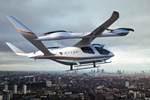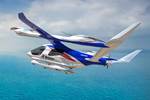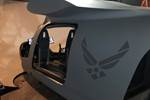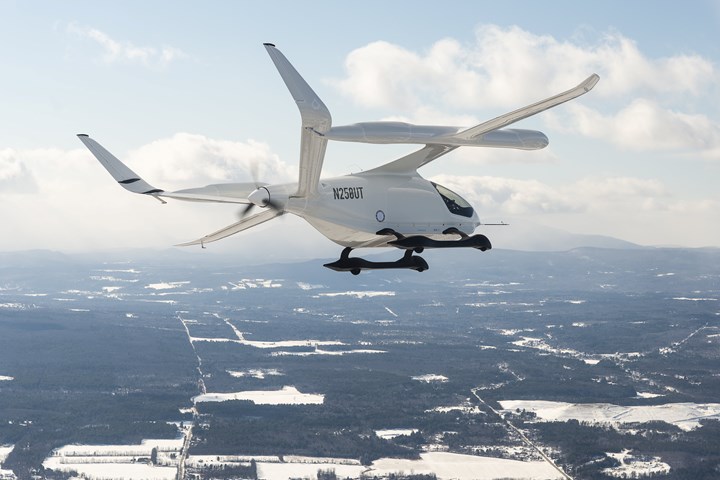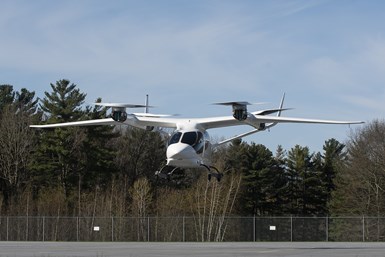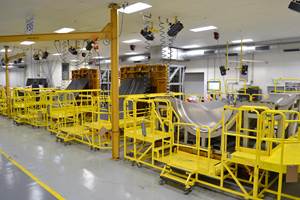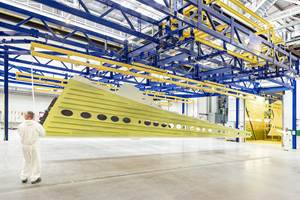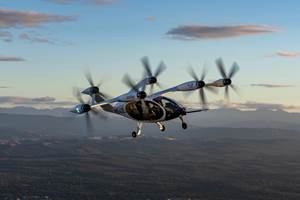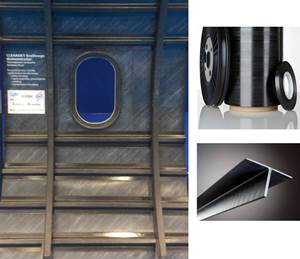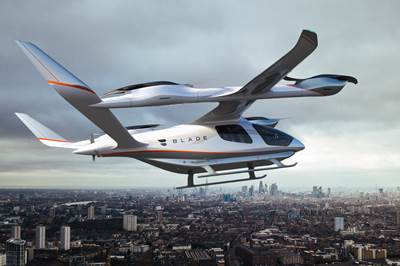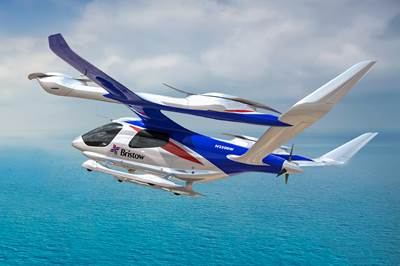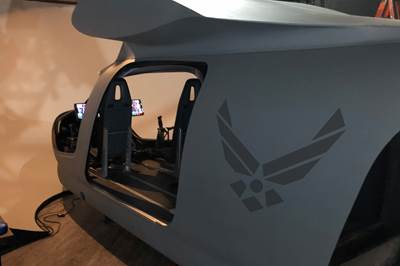Beta Technologies to produce, certify fixed-wing eCTOL
The revealed eCTOL CX300 all-electric aircraft is being designed, tested and certified in parallel with eVTOL model Alia-250. Certification and delivery are targeted for 2025.
On March 14th, Beta Technologies (South Burlington, Vt., U.S.) announced plans to certify the CX300, a conventional takeoff and landing (eCTOL) model of its all-electric aircraft. This marks the company’s second all-electric aircraft offering, as it will pursue this design in parallel with its already-underway vertical takeoff and landing (VTOL) Alia-250, featuring infused composite components and structures. New and existing customers have placed orders for the eCTOL aircraft, including United Therapeutics (Silver Spring, Md., U.S.), Bristow (Houston, Texas, U.S.) and Air New Zealand (Auckland).
This news follows years of successful flights with CTOL and VTOL test articles of the Alia aircraft. Beta says it tests two prototypes simultaneously in order to capture twice the performance data and concurrently focus on both hover and wingborne flight — eVTOLs spend more than 98% of flights in wingborne cruise.
According to the company, its eCTOL test article has shown reliably strong performance, hitting key milestones including:
- Flying more than 22,000 miles
- Crossing multiple state lines
- Completing qualitative evaluation flights with Federal Aviation Administration (FAA), Air Force and Army test pilots
- Closing a range of more than 386 miles
Beta has designed both aircraft to fulfill essential missions for its customers, optimizing payload and range to enable short-haul and regional operations with zero operational emissions and reduced operational costs. With these advantages — as well as fast charging and a low noise profile — the company’s aircraft is tailored to meet the diverse needs of its customer base across the cargo, medical, defense and passenger sectors.
“We have been flying our eCTOL prototype airport-to-airport for a few years now to drive technological advancements in propulsion and systems, and now we’re seeing that there is a clear market for this product in addition to our eVTOL aircraft,” Beta’s Founder and CEO, Kyle Clark, says. “Global operators are looking for practical solutions to help meet their sustainability commitments, and after seeing the cost and performance of this prototype, our customers are eager to integrate it into their fleet. With its known certification and operational path, this aircraft represents an opportunity to get electric aviation into the market, and into the hands of our customers, as quickly as possible.”
Beta applied for type certification of the CX300 with the FAA last year under Part 23, and is targeting 2025 for certification and delivery. The airframe, batteries, propulsion and systems used in the CX300 will be common to the Alia-250, which is already advancing through the FAA certification process.
Beta continues to progress its Alia-250 eVTOL test article. Hovering on its current flight controller and algorithm began five years ago with the company’s first prototype. It has since migrated to the current Alia eVTOL test article, achieving a first hover in 2020, and envelope expanding maneuvering hover flights since. Both aircraft variants have steadily advanced along Beta’s rigorous flight test program and certification roadmap, with regular oversight and partnership from the Air Force and FAA.
“We continue to progress our Alia eVTOL design through certification, in harmony with the eCTOL program,” Clark adds. “The two aircraft are common in their design, allowing us to economize validation of our high-performance solutions. With the eCTOL aircraft launch we have further de-risked our path to commercialization and concurrently provide lower cost, more utility and optionality to operators. This has given us the confidence to industrialize and invest heavily in production at scale over the last year.”
eCTOL aircraft supports global missions
With what is said to be its reliable and efficient operations, the CX300 will meet a variety of regional medical, cargo and passenger missions for customers. This aircraft offers a clean, cost-effective solution for fleet replacement and route expansion and, with its airport-to-airport capabilities, it will be a low operational cost, high-use aircraft that operators can integrate into their networks immediately.
Several global operators have placed orders for Beta’s CX300, citing plans to integrate the eCTOL into cargo and passenger network operations as part of a stepwise approach to electrifying their fleet for the future.
- Air New Zealand, after selecting Beta as a partner in its Mission Next-Gen Aircraft program in 2022, has declared an intent to order three eCTOL aircraft, with an option for 20 more. Air New Zealand has an ambition to fly its first zero-emissions commercial demonstrator flight from 2026.
- Bristow, a global provider of sustainable vertical flight solutions, has placed a deposit-backed order for up to 50 eCTOL aircraft. This comes in addition to its original order of five eVTOL aircraft, with an option for up to 55 more.
- United Therapeutics has added an order for eCTOL, with plans to use Beta aircraft to transport its unlimited supply of manufactured organs for transplantation, and medical equipment for transplant.
Plans to certify the CX300 follow more than two years of successful test flights of BETA’s eCTOL aircraft. The Company has built strong momentum in both horizontal and vertical flight through its rigorous flight test program, reaching industry-first milestones including:
Beta is in the final stages of construction on its production and manufacturing assembly in South Burlington, Vermont (read “Beta Technologies secures 75-year aircraft facility lease at Burlington International Airport”). This facility, where the company plans to conduct final assembly of its all-electric aircraft, is on track to begin manufacturing of aircraft this summer.
Related Content
Plant tour: Middle River Aerostructure Systems, Baltimore, Md., U.S.
The historic Martin Aircraft factory is advancing digitized automation for more sustainable production of composite aerostructures.
Read MorePlant tour: Spirit AeroSystems, Belfast, Northern Ireland, U.K.
Purpose-built facility employs resin transfer infusion (RTI) and assembly technology to manufacture today’s composite A220 wings, and prepares for future new programs and production ramp-ups.
Read MorePlant tour: Joby Aviation, Marina, Calif., U.S.
As the advanced air mobility market begins to take shape, market leader Joby Aviation works to industrialize composites manufacturing for its first-generation, composites-intensive, all-electric air taxi.
Read MorePEEK vs. PEKK vs. PAEK and continuous compression molding
Suppliers of thermoplastics and carbon fiber chime in regarding PEEK vs. PEKK, and now PAEK, as well as in-situ consolidation — the supply chain for thermoplastic tape composites continues to evolve.
Read MoreRead Next
Beta secures order for 20 composite eVTOL ALIA aircraft
Blade Urban Air Mobility operators to receive first passenger-configured Beta aircraft in 2024. Additional partners span medical, logistics, defense and passenger market segments.
Read MoreBristow signs order for up to 55 Beta Technologies ALIA-250 eVTOL aircraft
Innovative, sustainable vertical flight solutions provider places firm order for five aircraft, with an option for an additional 50 to be used for moving passengers and time-sensitive cargo.
Read MoreU.S. Air Force awards airworthiness approval to Beta Technologies ALIA aircraft
Endorsement follows manned electric aircraft into next phase of flight testing, with the goal to enable new markets and accelerate UAM development.
Read More

